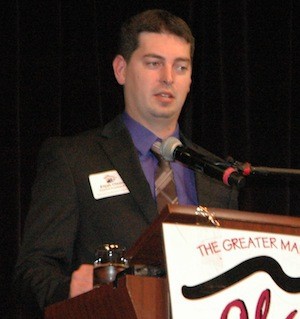TULALIP — All six of the Marysville City Council candidates in contested races this fall were represented at the Greater Marysville Tulalip Chamber of Commerce’s candidates forum on Friday, Sept. 27, as the Chamber asked them to address the city budget, tax revenues, economic growth, traffic and infrastructure.
When asked about the current relationship between the city of Marysville and the Tulalip Tribes, Position 1 incumbent Jeff Vaughan and challenger Elijah Olson agreed that it’s vital to both communities, and has improved dramatically over the years.
“We’ve become strong partners, and while we might not agree on everything, there’s always a mutual respect,” said Vaughan, who pointed to ongoing efforts of both city and Tribal officials to coordinate joint transportation and public works projects for their mutual economic development.
While Olson would like to see the city and the Tribes focus more on issues they share in common, such as drug enforcement and the status of the Marysville School District, he echoed Marysville Mayor Jon Nehring’s expressed concerns with waterfront revitalization and how the coming of more coal trains will contribute to existing traffic congestion.
“We need to be responsible with taxpayers’ money,” Olson said.
In addition to fixing the city’s existing roads “to take care of what we have,” Vaughan placed priorities on supporting businesses, funding public safety and maintaining the reserve fund, when asked how he would invest tax revenues.
Position 3 incumbent Jeff Seibert is being challenged this fall by B.J. Guillot, but because he was unavailable to attend the candidates forum, Kristin Cook acted as Guillot’s representative, and summed up his concerns as including emergency medical services, panhandling prevention and drug enforcement, the latter of which Cook asserted, on Guillot’s behalf, should not be limited to the city’s Stay Out of Drug Area.
Seibert advocated improving transportation infrastructure by continuing to apply for federal grants for projects such as converting the 156th Street overcrossing into a full-fledged interchange, and echoed the already voiced support of downtown and waterfront revitalization to improve the city’s business climate.
“We’ve also worked to streamline the permitting process, to make it more amenable to businesses,” Seibert said.
When asked how they would allocate city funds to city services, Position 7 challenger Scott Allen deemed the city’s public safety and security “number one,” an assessment that incumbent Kamille Norton agreed with, even as she joined the call to alleviate traffic congestion and touted the merits of the city’s parks.
“We have some true gems that a number of residents don’t even know are here,” said Norton, who echoed Nehring’s suggestion of a full interchange connecting Interstate 5 and State Route 529, to circumvent congestion caused by trains crossing Fourth Street. When Allen countered by proposing an overpass at the railroad crossing intersection on Fourth Street, Norton reiterated her fears that such a move would wipe out the surrounding local businesses.
“I live in Sunnyside, whose streets were last repaved in 1972,” said Allen, when asked what his budget priorities would be. “I also think we need to bring back motorcycle police.”



